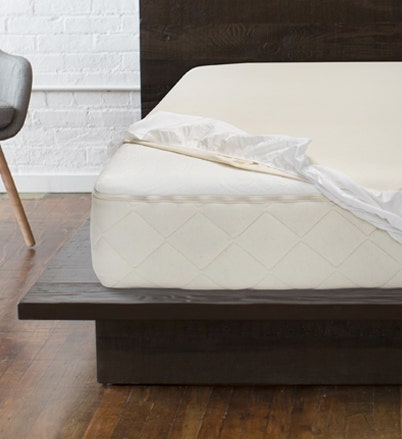
The birds are again chirping, green buds dappling tree branches, and daylight hours stretching longer and longer each week – the turn of the season has finally arrived, and it’s brought sleep disturbances with it. Wait, what?
It’s true. ‘Tis the season for tired mornings and sleepless nights. But the spring time change is far enough behind us that we can't blame it anymore if we’re feeling sluggish. Or, can we?
The relationship between natural light and sleep has to do with your circadian rhythm, and yours just might be what’s messing with your sleep. Here's how to fix it.
What is a circadian rhythm?


You’re awake when it’s light outside and sleep when it’s dark. This isn’t arbitrary, but rather the result of your circadian rhythm. Circadian rhythm … kind of a fancy way to say “clock,” isn’t it? But that’s exactly what it is: your body’s internal clock, governed by the rising and the falling of the sun. It’s what gets us up in the morning and lulls us to sleep at night. Here’s how it works.
Inside your brain’s hypothalamus is a master clock called the suprachiasmatic nucleus. (Circadian rhythm doesn’t sound that fancy anymore, does it?) This master clock takes its cues from light and darkness to instruct cells to do things like make you feel hungry, tired and awake, and hormones are its messengers.
Melatonin’s an example of one of these hormones that you’ve probably heard of. When the sun goes down, your brain starts producing melatonin to signal to your body that it’s time to start winding down, too. Day and night – it’s not arbitrary, it’s science!
Signs your circadian rhythm is off
Everyone has woken up feeling tired the morning after a poor night’s sleep here and there. But if you find yourself waking up tired again … and again … and again … your circadian rhythm might be to blame. Especially if you feel like you’re getting your full eight hours of sleep each night.
If you’re regularly experiencing these symptoms no matter how much sleep you get, your circadian rhythm might be out of whack
- Extreme daytime sleepiness
- Trouble falling asleep and staying asleep
- Brain fog and difficulty concentrating
- Sleeping better on weekends than weekdays
- Decreased motivation
- Depression and anxiety


What throws circadian rhythms out of whack?
If you guessed Daylight Savings Time, you would be correct! Time changes throw your circadian rhythm majorly out of whack – that’s right, one hour can make a huge impact. Your brain is used to the sun rising and falling at the same time each day. Then one morning, you wake up, and the natural order of things has been completely disrupted. You might understand that 7 a.m. is still time to wake up, even if the sun isn’t out yet, but your body’s on a completely different page.
Other factors can impact your circadian rhythm, too. Sometimes, these disruptions are temporary – say, you started a new job and have to wake up an hour earlier than before. Pulling all-nighters for finals week? Your circadian rhythm might suffer. Have you ever experienced jet lag? Another prime example of circadian rhythm disruption. Other times, however, circadian rhythm disruption can be a sign of a larger problem: circadian rhythm disorders.
Circadian rhythm disorders vs. disruptions
Circadian rhythm disruptions are temporary. Started a new job? After a few weeks, that 6 a.m. alarm won’t feel so early. Got jet lag after traveling abroad? Give yourself a few days back in your home time zone, and you’ll be sleeping better again.
A sleep rhythm disorder isn’t so easily fixed. Circadian rhythm disorders can be caused by aging, genetics or more serious health conditions such as sleep apnea. If you’ve got symptoms of circadian rhythm disruption that you just can’t seem to sleep off, you should talk to your doctor.
Why it's important to fix your circadian rhythm
Healthy sleep is essential for a healthy life – you can’t have one without the other! Healthy sleep is one of the keys to physical, social and emotional health. (Luckily, practicing good sleep hygiene – AKA, daily routines that promote healthy sleep – can be as easy as a few routine changes!)
Moreover, if left untreated, circadian rhythm disorders increase the risk of certain health problems or can even lead to workplace and road accidents. It’s not just your health that depends on sleep … it’s your safety, too!
3 Ways to reset your circadian rhythm
Want to reset your circadian rhythm? While it may take a little time, the process is actually fairly simple. Here are three things to keep in mind:


1. Make a schedule and stick to it
The first and foremost tenant of proper sleep hygiene is routine. Try to go to sleep and wake up at the same time each day. Unfortunately, yes, this includes weekends.
It’s true that practice makes perfect, and proper sleep is just like a muscle that you have to train. Of course, we mean all of this within reason – you’re only human, and if you’re a few minutes off here and there, that’s okay. But if you want to sleep consistently, you have to behave consistently!
Don’t want to leave all the heavy lifting to your brain? Create a bedtime routine for yourself. It can be anything you like, as long as it doesn’t include screen time. Taking a bath, practicing bedtime meditation, changing into comfy pajamas and reading a book are all common ways people unwind before bed. If you do it consistently, your brain will take that as a cue (just like the sun going down) to start producing melatonin.
2. Be kind to your body
Like we said before, health and sleep go hand-in-hand. If you want to sleep well, start by taking good care of your body. Eat three meals a day, avoid sleep-disrupting alcohol and caffeine, and try to exercise each day. You get bonus points if you exercise outside! Circadian rhythms love daylight, remember? Spring is a great time to incorporate daily walking into your routine.
The more physical activity you get, the more your body needs that recovery period at night … and it will do anything to get it. So, if you exercise during the day, chances are you’ll have an easier time falling asleep at night. If you’re feeling sluggish in the morning, exercise is also a great way to wake up your body and get you going. Just make sure you don’t exercise right before bed, or you may have trouble winding down.
3. Allow for an adjustment period
“These things take time,” as the saying goes. Adjusting your circadian rhythm will take some time, because it’s just that: an adjustment.
If you want to help your body get used to waking up earlier after a time change, try using 15-minute increments every few days. If your bedtime used to be 11 p.m. for a 7 a.m. wake-up, but springing forward has pushed it to midnight, try falling asleep at 11:45 p.m. at the beginning of the week. Adjust for two to three days, and then push it back to 11:30 p.m. Repeat. Repeat. You should be back to your old routine in a week or so!





